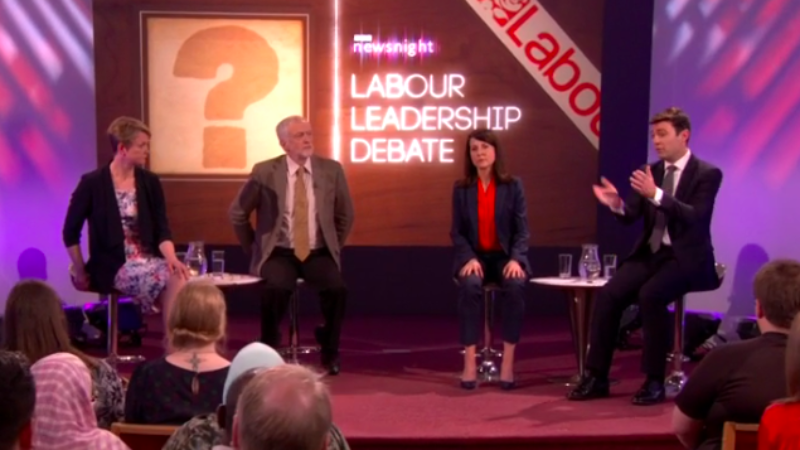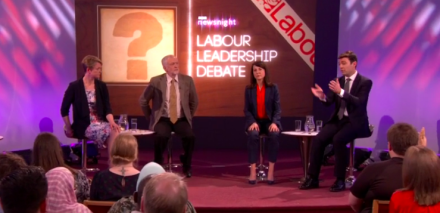

Both Liz Kendall and Jeremy Corbyn have more in common than they or their supporters will admit.
Both hark back to a simpler and more glorious era: the Corbyn team look back to when Tony Benn was around, the Kendall team want to recreate the Tony Blair era. Both principally define themselves against others: Corbyn as the only candidate against austerity and Kendall as the only one who one who isn’t “continuity Miliband”. Both want to win back ‘lost’ voters: Corbyn from the left while Kendall from the right. Both want to appear as strong, determined and uncompromising.
But their similarities also illustrate why neither should win the Labour leadership race. Not only would both only end up further splitting the Labour party, Corbyn or Kendall could end up destroying its broad church of voters for a generation.
The Liz Kendall assumption is that the electoral coalition that Blair built can be replicated in the same way. But that looks highly unlikely and there’s no evidence it can be. Labour now has serious competition on its left from the Greens, the SNP and even Plaid Cymru. In 1997 the three major parties got over 90% of the British vote, while Tories and Labour together had 74%. These statistics now seem unreachable again.
Blair assumed that the left had nowhere else to go then and he was right during his time. But that rule no longer applies, especially in Scotland. Worse, by looking like she wants to recreate the Blair coalition than forge her own, Kendall is in danger of looking opportunistic not genuine.
Similarly, Jeremy Corbyn’s supporters assume his principled character would help Labour, without asking whether his principles actually chime with the public. This argument that he could rehabilitate Labour is based on very shaky assumptions.
His loudest supporter, Owen Jones, wrote that Corbyn could “rebuild a left with popular appeal” by focusing on an economically populist message that includes rail nationalisation and the Living Wage. The problem is that while Corbyn would no doubt appeal to Green and SNP voters, but he would more likely repel Britons who voted UKIP or Tory. And Labour needs far more of the latter than of the former.
His supporters similarly assume Corbyn as leader would appeal to non-voters. But this looks even more unlikely. The largest survey of Labour’s voters “lost” since 1997 found that they are culturally conservative Britons who overwhelmingly describe themselves as centrists or right-wing. “For every Guardian or Mirror reader there are four who read a right-wing paper,” wrote YouGov’s Peter Kellner. They are the Mail and Express readers that many lefties hate.
The uncomfortable fact for Corbyn supporters is that non-voters and UKIP voters don’t want more redistribution, they want less immigration and expenditure on welfare. They want more patriotism. They are culturally conservative Britons who don’t feel connected with a Labour party that sounds young, liberal and metropolitan.
To build an election-winning coalition that doesn’t appeal to the ‘slash immigration and benefits’ crowd means Labour has to appeal to more liberal and centrist voters. But they can only be won over with a more economically prudent message. This is the dilemma Labour faces and why Corbyn is unlikely to lead Labour to victory.
Some argue that they would rather Labour be a party of principle than one in naked pursuit of power. But Labour isn’t meant to be a left-wing pressure group (there are plenty out there you can join, many which feed into Labour policy making) — it has to find ways to win power or it will wither and die. Plus, every politician in power has had to make compromises (yes, including Tony Benn!) because voters don’t all think alike.
Labour voters have always been a broad church: socialists, environmentalists, socially conservative but economically left voters, socially liberal and fiscally conservative voters and other mixtures.
The Labour leadership should embody a mixture of passion and competence, not one or the other. The problem with both Corbyn and Kendall is that they only appeal to one segment of Labour voters, while alienating other parts of the church needed to propel the party to victory.




More from LabourList
‘The High Court judgment brings more uncertainty for the trans community’
‘There are good and bad businesses. Labour needs to be able to explain the difference’
‘This ruling should now remove any remaining barrier to approval of EHRC code’